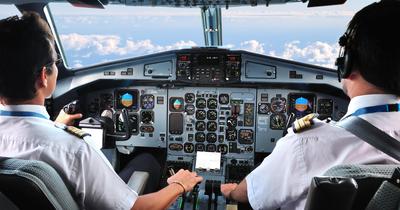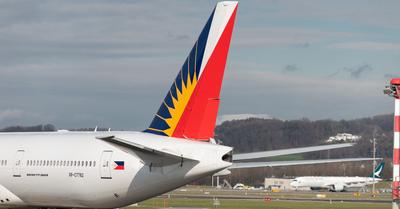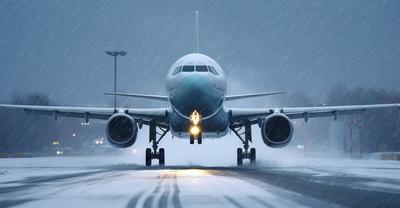This article may contain affiliate links where we earn a commission from qualifying purchases.
As a pilot, you may have multiple homes and you likely work in various states around the country. So how do pilots actually get taxed?
At the federal level, pilots are taxed the same way that other workers in the US are taxed — at the marginal tax rates based on their income. At the state level, pilots may owe taxes in their state of residence as well as any other state where they earn 50% or more of their income as a pilot.
Taxes are without a doubt one of the most misunderstood aspects of personal finance no matter what you do for a living. But as a pilot, you may have multiple homes (or “crash pads”), you might work in different states, and you might have all sorts of travel expenses. All of which can make figuring out your taxes even more difficult. In this article, we’ll touch on federal income tax, state income tax, specific examples and provisions, and more.
Here at SkyTough, we are focused on providing our readers with the best, most helpful content that they can find anywhere on the web. While we combined in-depth research and our own experience into this article, I have to put a disclaimer that this is not tax advice. For any tax questions, you should always consult a tax professional to help ensure you are reporting and paying everything correctly. But this article will point you in the right direction!
Pilots And Federal Income Tax
When it comes to paying taxes as a pilot, federal income tax is a bit easier to look at than some of the more nuanced aspects of the process. Since federal income tax is its own separate thing, regardless of which state you live in or anything like that, it’s fairly straightforward to figure out how you’re taxed. Even as a pilot.
With how the tax code and tax system works in the United States, I could write a handful of articles on all sorts of topics that have to do with paying your federal income tax as a pilot, but for the sake of brevity we’ll keep it a bit short. For income tax, the main thing to understand is that the tax system in this country works with marginal tax rates. This means that your entire income is not taxed at whatever tax bracket you’re in.
Instead, your income is taxed at separate rates for each tax bracket. This is something that many people do not understand about taxes and they fear that their entire income is taxed at whatever tax bracket they’re in at the top end based on their total income. But that’s not the case. Each tax bracket is taxed at that particular rate, only on the amount of income in that bracket.
So as a pilot, your total income might be $100,000. Tax rates change all the time, so be sure to know what the current rates are during the year you’re interested in. For the sake of argument, let’s say your $100,000 puts you in the 24% tax bracket at the top end. But you wouldn’t owe 24% of that $100,000. Instead, you’d pay the lower percentages on each of the three brackets below 24% on the different levels of income. In fact, the only amount of money that you’d owe the full 24% on is anything from the bottom of the 24% bracket to your $100,000 income.
So it’s not nearly as bad as it seems!
The other main thing to consider when it comes to federal income tax (as well as state income tax) is what you’re able to deduct. Deductions lower your taxable income and reduce the amount of taxes that you owe come tax time. These are usually key to either owing more money at the end of the year or getting a tax refund.
Can Pilots Write Off Expenses Related To Work?
Before we touch on what you may or may not be able to write off as a pilot, just remember that you should discuss this with a tax professional when you’re preparing your taxes. The IRS’ governing law and the tax code can be interpreted in different ways, so it’s important to go over all of your tax implications (including write-offs and deductions) with a tax professional.
That said, there are some aspects of being a pilot that you can potentially write off, depending on your situation. Two of the main things that pilots wonder about is whether they’re able to write off travel expenses as well as aircraft expenses. This will always be situation-specific, but there are some things that you should feel comfortable being able to deduct.
Are Travel Expenses Tax Deductible For A Pilot?
As a pilot, you might live in one city, operate mainly out of another (or multiple others), and even have a few different apartments or “crash pads” that you stay at when you’re working from these other cities. This can be confusing and it largely comes down to where your “tax home” and where your place of residence is.
Your residence is your main home, where you spend most of your time and maintain most of your connections. Your tax home is the location of your regular place of business. Travel expenses from your residence to your tax home are typically not deductible, just like people with other careers can’t deduct expenses related to their commute from their homes to their offices.
However, expenses incurred while away from your tax home might be deductible. This could be traveling from your tax home to one of the other cities that you fly out of, plus living expenses while staying there as long as you have to be there explicitly for work. The key to all of this is knowing what the IRS sees as your residence, your tax home, and other work-related travel expenses. It can be confusing, so be sure to consult a professional to see exactly how the IRS will interpret your situation!
Can Pilots Write Off Aircraft Expenses On Their Taxes?
The other main potential write-off for pilots (especially for those that own their own aircraft) is the expenses related to the airplane itself. If you’re using your own airplane for business purposes, whether that’s you operating your own business or using it to further the profit and success of your employer’s business, you may be entitled to write off some of the related costs and expenses on your taxes.
Just like I mentioned above, this will typically be case-specific and you should consult a tax professional before writing off every aircraft expense that you incurred over the previous year. When it comes to taking your own deductions, you have the burden of proof to show the IRS that you’re actually entitled to those expenses. So it’s important to keep records of everything and have an idea of what you can really write off.
The key to writing off airplane expenses is that they have to be directly related to your business. This is a broad statement, but that’s the type of wording in the actual tax code. If you’ve bought an airplane that is expressly used for business purposes, you could potentially write just about everything off. This could include the monthly payment for the plane, maintenance, fuel, insurance, storage, and more.
As long as you can prove that the expenses are incurred for business purposes and are “ordinary and necessary”, then you should have a case to deduct as much as possible. Work with a tax professional that you trust and keep records of everything, that way you can potentially deduct as much as possible and save some serious money on taxes!
How Do Pilots Pay State Income Tax?
Outside of federal taxes, another big question that pilots have about how they’re taxes is when it comes to state taxes. Since pilots can work in states all across the country, depending on which routes they fly and where they go, how do they pay state taxes? Is it based on where you live or where you work? Or both?
The good thing is that the IRS of course understands this as well, and has certain provisions for transportation employees including pilots. According to the IRS, pilots are subject to state taxes in the state in which they live (i.e. their state of residence) and also any state where they earn more than 50% of their income as a pilot. This is based on if the pilot spends 50% or more of their flight time in any state that they do not live in.
So as a pilot, you’ll have to pay state taxes in the state you live in no matter what. But if you spend at least 50% of your flight time in any other state, you might also have to pay state income taxes in that state. If that’s the case, you then may be entitled to a tax credit to reimburse you for some of the taxes you paid in your state of residence.
In the end, you shouldn’t end up having to pay double state taxes or anything like that since you should be entitled for a tax credit to prevent such a thing. This can become a bit more interesting if you live in a state with no income tax but do more than 50% of your work in a state with income tax. As always, discuss your own situation with a tax professional to ensure you are not overpaying your state income tax!














